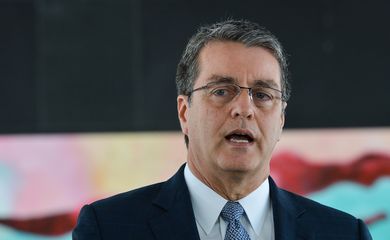Director-General: government shift not to change Brazil's role in WTO


WTO Director-General, Brazilian diplomat Roberto Azevêdo

The World Trade Organization (WTO) Director-General, Brazilian diplomat Roberto Azevêdo, said Brazil's government shift will not change the country's stances on the main body that manages the multilateral trading system. "In WTO, trade deals are not interrupted, even in moments of transition. We have elections, WTO [countries] members change their administration and trade deals move forward. "
Azevêdo said that "Brazil may alter its stance on one or another trade deal, but it will never lack commitment and examination [of the organization's issues]. Trade deals are being negotiated as usual. "
Addressing in a meeting with businessmen at the Federation of Industries of the state of Rio de Janeiro, on Thursday (Jun. 16), the WTO Director-General said that Brazilian agribusiness is one of the sectors that can move forward and exports can reach higher levels. "A country with the capacity and the potential for agricultural production has to positively use this sector."
“[Agribusiness] provides one of the main contributions to balance government accounts, as a key export sector that builds up reserves. This is Brazil's natural potential, and the WTO trade deals can bring major benefits for agribusiness. In December, we removed agricultural export subsidies, which is a big gain for Brazilian exporters and developing countries in general,” he said.
Azevêdo also mentioned China's protocol of accession to the WTO—signed in 2001, allowing country members to consider China as a Non-Market Economy (NME) until the end of 2016. The decision to grant market economy status to China brings not only a technical problem, but a political problem. The solution for the issue is important for Brazil and other countries, and also for exporting entrepreneurs, he pointed out.
"Currently China is the world's leading trading nation. It is a trading partner of a large number of countries and has a great ability of breaking into markets that no one could ever guessed it would have," said Azevêdo. He explained that as Director-General he has no right to interpret any legal provision and only three WTO bodies are able to do this. This includes China's protocol, which is a multilateral agreement.
"It is an agreement with 160 countries. There are only three [decision-making] bodies. One of them is the WTO General Council; another is the Ministerial Conference, and both of them must reach a consensus [about the decision], that is, China has to agree with their interpretation; so we do not expect it to be an easy thing. The third body is the Appellate Body," said Azevêdo.
Translated by Amarílis Anchieta
Fonte: Director-General: government shift not to change Brazil's role in WTO





